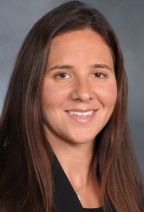Amanda Sacks-Zimmerman, Ph.D., ABPP

Amanda Sacks-Zimmerman, Ph.D., ABPP

Locations and Appointments
Please contact the doctor's office to verify that your insurance is accepted.
*Indicates this doctor is no longer accepting new patients with this insurance plan.
- HMO
- Medicare
- PPO
- EPO/POS
- CHP
- Blue Access
- EPO
- HMO
- Mediblue (Senior)
- PPO
- HMO
About Amanda Sacks-Zimmerman, Ph.D., ABPP
As a result of any neurological condition or brain injury (including the trauma of brain surgery), an individual may experience overwhelming and disorienting emotional and cognitive changes. Adapting to these changes requires someone to truly see themselves as having the ability to incorporate change, to compensate, and to build on existing cognitive and emotional skills. I have the privilege of being able to provide the treatment that can help with this process. As a neuropsychologist with Weill Cornell Medicine Neurological Surgery, I use cognitive remediation and psychotherapy to help patients recover from surgery, chemotherapy, traumatic brain injury, and other neurological conditions. I follow one overarching principle in order to be effective: Everyone has strength, both cognitive and emotional. Such strength might not be completely realized until an individual sustains a setback, so my job is to explore, search, and find this strength collaboratively with the patient. I then adapt treatment to the individual, not only to build cognitive skills but to bring awareness of these strengths to the individual. Ultimately, such collaborative treatment will result in better functioning and a more satisfactory life.
Amanda L. Sacks-Zimmerman, Ph.D., ABPP-CN, is a board-certified clinical neuropsychologist who has had extensive experience in assessing and treating neurological disorders with cognitive remediation as well as researching the cognitive impact of brain injury. She treats a variety of patients who suffer from cognitive and emotional difficulties that may be the result of epilepsy; radiation or chemotherapy; cardiopulmonary bypass procedures; surgery; cerebrovascular disease; stroke; silent infarcts; brain tumor resection; movement disorders such as multiple sclerosis, Parkinson’s disease, and Huntington’s disease; metabolic disorders; infectious processes such as encephalitis or Lyme disease; chemical toxin exposure; traumatic brain injury; and dementia diagnoses including mild cognitive impairment, Alzheimer’s disease, multi-infarct dementia, and frontal temporal dementia.
****************************************************************
Dr. Sacks-Zimmerman sees patients at 520 East 70th St. @ York Ave. (Starr 651) For more information or to schedule an appointment, visit https://neurosurgery.weillcornell.org or call 212-746-3356
****************************************************************
TRAINING
Dr. Sacks-Zimmerman received her undergraduate degree in Psychology from The George Washington University and her Ph.D. in Clinical Psychology from the Fairleigh Dickinson University. She completed two postdoctoral fellowships, one at University Behavioral Healthcare, UMDNJ, in Piscataway, New Jersey, focusing on geropsychology and one at Mount Sinai Medical Center in New York in the Department of Rehabilitation Medicine, where she was trained in assessing, treating, and researching acquired and traumatic brain injury. Additionally, she has been a staff psychologist at NYU Langone Medical Center Rusk Institute of Rehabilitation Medicine for three years and a neuropsychologist in the Faculty Group Practice in the Department of Psychiatry at the NYU Langone Medical Center and is faculty appointed to the Department of Anesthesiology at the NYU Langone Medical Center.
RESEARCH
Dr. Sacks-Zimmerman has been involved in various research projects throughout her training and professional career. Specifically, during her first postdoctoral fellowship at the University Behavioral Healthcare, UMDNJ, she derived research projects examining cognitive correlates of emotion in dementia as well as published book chapters regarding PTSD and family interventions in older adults. During her second postdoctoral fellowship at Mount Sinai Medical Center, she assisted in deriving manualized Cognitive Behavioral Treatment for individuals post-TBI for the purpose of researching the efficacy of this treatment, participated in systematic reviews of literature on evidenced based practices of treatment post TBI, developed research projects, published findings, and presented at conferences on TBI and aging. During her time as a faculty appointed member to the Department of Anesthesiology at NYULMC, Dr. Sacks-Zimmerman analyzed and presented data on post-operative cognitive dysfunction as well as derived research studies on cognitive issues post-operatively in cardiac patients and cognitive issues related to compliance in the wound care population. She is currently in the process of developing research projects to examine the efficacy of cognitive remediation programs on post-operative cognitive difficulties in brain tumor patients within the Department of Neurological Surgery Weill Cornell Medical College.
5-STAR REVIEW from Vitals.com"Really focused and always has new ideas for situation or problem solving. Also she is beautiful and a warm giving person. I recommend completely!"
-
Ph.D.Fairleigh Dickinson University2006
-
B.A.George Washington University1998
-
PsychologistNewYork-Presbyterian Hospital
-
Associate Professor of Neuropsychology in Clinical Neurological SurgeryWeill Cornell Medical College, Cornell University
News & Media
External Relationships
Relationships and collaborations with for-profit and not-for profit organizations are of vital importance to our faculty because these exchanges of scientific information foster innovation. As experts in their fields, WCM physicians and scientists are sought after by many organizations to consult and educate. WCM and its faculty make this information available to the public, thus creating a transparent environment.
No External Relationships Reported
